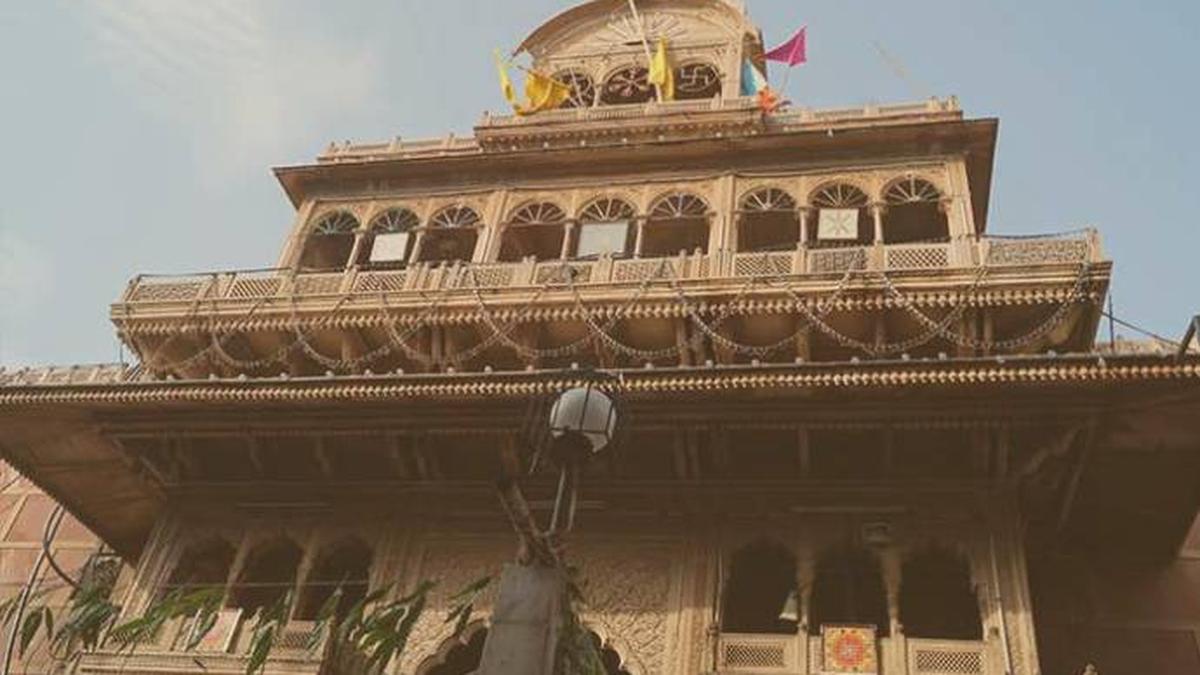In a strong rebuke to calls from right-wing groups urging a boycott of Muslim traders and artisans following the recent Pahalgam terror attack, the revered Banke Bihari Temple in Vrindavan has stood firm in its commitment to communal harmony and legacy of the temple tradition. The temple’s administration has emphasised the deep-rooted and indispensable role of Muslims in the upkeep and traditions of the shrine, rejecting any notion of exclusion based on religion.
Muslims are integral to temple traditions
Speaking on behalf of the temple administration, Gyanendra Kishore Goswami, a senior priest and committee member, clarified that any call to boycott Muslims was neither practical nor aligned with the spiritual values of Brijmandal, the sacred region encompassing Vrindavan.
“It is not practical. Muslims, particularly artisans and weavers, have deep-rooted contributions here. They’ve played a major role in weaving the dresses of Banke Bihari for decades,” Goswami said. “Many of them have a strong belief in Banke Bihari and visit the temple too” he said, reported Times of India.
For generations, skilled Muslim craftsmen have produced intricate crowns, bangles, and garments for the deity. Their craftsmanship, honed over decades, is vital to the temple’s rituals and daily adornment of the idol. Their devotion, Goswami notes, transcends religious labels.
The response came after some fringe groups held protests in Mathura and Vrindavan, urging Hindu shopkeepers and devotees to boycott Muslim-owned businesses. These groups reportedly demanded that Muslim traders display the proprietor’s name on their shop signboards—an act widely perceived as coercive and discriminatory.
However, Goswami was unequivocal in his stance and said that, “Yes, those terrorists (in Pahalgam) should be punished severely, and we’re totally with the government. But in Vrindavan, Hindus and Muslims live together in peace and harmony” TOI reported.
His message was echoed by several priests and local residents, who expressed solidarity with the Muslim artisans and business owners who have coexisted peacefully in the holy town.
“Bhakti is supreme in Brijmandal”
Goswami, who also serves as the Rajbhog Seva Adhikari at the temple, further emphasised that devotion—bhakti—is the highest principle in the spiritual ethos of Vrindavan.
“Bhakti is supreme in Brijmandal. It rises above knowledge or even detachment (vairagya). If someone has faith and comes for darshan, why should we oppose it?” Goswami asked, reported The Hindu.
Support for Muslim shopkeepers
Just steps away from the temple, Javed Ali, a Muslim shopkeeper who has been selling religious items for over two decades, shared his experience of intimidation by protesters. He was asked to visibly display his name on his shop’s signboard or vacate.
“They came to my shop and asked us to put the name of the proprietor on the signboard. I’ve been running this shop for over 20 years. My father worked here as a tailor. Whenever a customer buys things, I usually give them a bill with my name and mobile number. We have nothing to hide,” Ali said. “With the blessings of Banke Bihari, this place is always peaceful” TOI reports.
His neighbouring shop owner, Nikhil Aggarwal, affirmed that the local community has never had any issues and often supports one another irrespective of faith.
“We’ve never had any problem. We work together and support each other,” Aggarwal noted.
When ‘God’ didn’t stop Raskhan or Rahim from composing bhajans
Lala Pandit, priest at the Danghati Temple in Goverdhan said that, “When God didn’t stop Raskhan or Rahim from composing bhajans, who are we to stop anyone from praying?”
“Lord Krishna is the god of love. There’s no room for hatred in his land” he added
Mahant Dinesh Chaturvedi of the Kali Temple in Mathura echoed the sentiment: “How can anyone prevent a devotee from entering a temple? Temples are public spaces. Every religion has both good and bad people.” Commenting on the impracticality of such boycotts, he added, “You can’t go around asking every shopkeeper about their religion before buying something. Besides, many Muslims have helped tourists in Kashmir. We shouldn’t paint everyone with the same brush” as reported The Hindu.
Govind Pandey, priest of the Dauji Temple in Baldev, also saw no issue with buying from Muslims.
Rejection of discriminatory demands
Earlier, temple priests had also strongly rejected a demand by Dinesh Sharma of the Shri Krishna Janmabhoomi Mukti Sangharsh Nyas to stop using garments crafted by Muslim artisans. Sharma argued that only those who followed “religious purity” should be allowed to make Lord Krishna’s attire.
Terming the demand both “impractical” and “misguided,” Goswami pointed out that about 80% of the temple’s attire—including crowns, garments, and zardozi work—are made by Muslim artisans. He also highlighted the logistical challenge of replacing such skilled labour, noting that the deity requires nearly a dozen ornamented outfits each day.
“How can we assess the personal purity of every artisan?” he asked. “If Prahlad could be born in the family of a demon king, and Kansa in the same lineage as Lord Krishna’s grandfather, then how can we judge artisans by their birth or religion?”
Goswami further emphasised that devotees themselves ensure purity when commissioning attire and offerings, reinforcing that faith, not exclusion, lies at the heart of temple customs.
A legacy of shared heritage
The involvement of Muslims in temple traditions is not new. Historically, Muslim artisans have played a vital role in creating the visual grandeur of the Banke Bihari deity. From intricate embroidery to metalwork, their contributions span generations. In similar traditions elsewhere—like the crafting of Rudraksha garlands in Kashi—Muslim families play key roles in Hindu religious life.
Even today, Goswami noted, Muslim musicians perform traditional instruments like the nafiri during festivals. Several acclaimed bhajan singers from the Muslim community continue to offer devotional service to Lord Krishna, embodying the spiritual unity Vrindavan is known for.
Related:
Vrindavan’s ISKCON temple sealed as priests, and many others test Covid-19 positive
Allahabad HC bats for tolerance, but refuses to strike down meat and liquor sale ban
Ram Navami violence: PILs seek SC monitored investigations, transfer of cases to NIA
